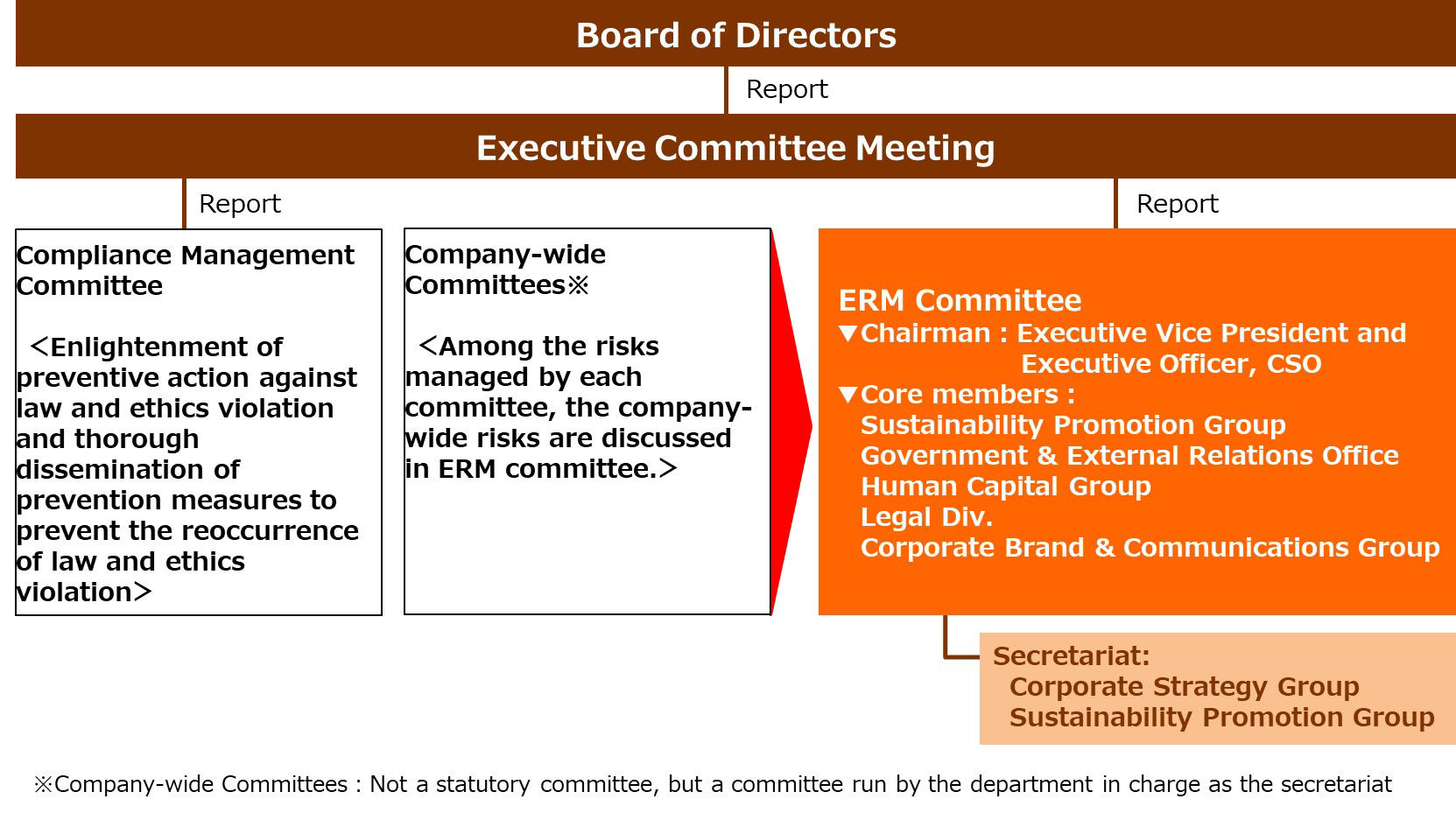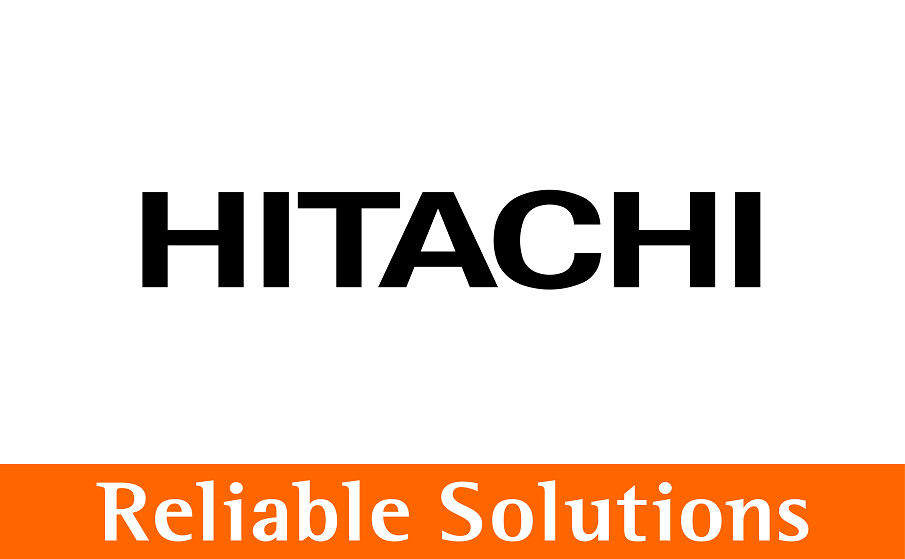Risk Management
Perspective on risk
When engaging in corporate activities, there are risks of encountering natural disasters, accidents, legal violations, or Infection. Based on this awareness, the Hitachi Construction Machinery Group always assesses risks, and strive to prevent those risks, or to minimize influence when it occurred.
Risk Definition and Classification
The Hitachi Construction Machinery Group classifies risks into the following seven categories. We work to prevent or limit the scope of damage from all kinds of losses (including human/material/financial damage, loss of credibility, legal violations and ethical violations) to the Hitachi Construction Machinery Group’s business, its’ employees and their families, and anyone related to the Hitachi Construction Machinery Group.
- Accidents and disasters (earthquakes, typhoons and other natural disasters, fires and explosions, conflicts, terrorism, etc.)
- Local community (environmental problems, complaints from neighbors, etc.)
- Corporate activities (violation of laws and regulations, product accidents, antisocial behavior/trade, etc.)
- Legal affairs (violations of restrictions on insider information, antitrust law and foreign exchange law violations, illegal export, etc.)
- General affairs and accounting (nonperforming loans, irrecoverable debt, monetary accidents, etc.)
- Information (leaks of confidential information, computer malfunctions, etc.)
- Company employees (work-related injury or illness, discrimination, scandal, etc.)
Measures against risks
The Hitachi Construction Machinery Group has established “Compliance and Risk Management Regulations” and is taking measures against risks.
The purpose of these Regulations is to provide for the prevention and early detection of ethics and legal violations and risk (hereinafter referred to as “Incidents”) and to provide for prompt and appropriate action in response to the occurrence of any such Incident, in order to ensure the safety of persons, to minimize any economic loss, to maintain business operations and prevent damage to the corporate image, and to prevent any recurrence of said Incidents. Based on these Regulations, we are implementing centralized management of incidents for the entire Hitachi Construction Machinery Group. When an incident occurs, we share the details and appoint a person in charge of formulating and operating recurrence prevention measures for Hitachi Construction Machinery and group companies to prevent recurrence throughout the group. The specific policy is as follows.
- When a risk arises, we will implement initial measures immediately. We will promptly assess the risk level and decide the range of the people to be informed, according to the severity of the risk.
- We will make constant efforts to raise the awareness of employees and other relevant persons to ensure that they recognize risks as risks, thoroughly understand the importance of compliance, proactively work to prevent the occurrence of risks and scandals, and take proper measures to cope with risks when they occur.
- When a risk arises, or there is the possibility of such, no matter how minor the risk is, we will immediately report the matter to a superior or to the General Affairs Department manager.
- We will regularly check risk potentialities and take measures to prevent the occurrence of each risk.
- We will always endeavor to maintain good relations with the local community (including police stations, labor standards inspection offices, fire stations, public employment security offices, local residents, etc.).
Enhancing global risk management
The Hitachi Construction Machinery Group is promoting to enhance of the risk management system for the overall Group in order to grow as a global corporation. In April 2022, the Hitachi Construction Machinery Group established the ERM (Enterprise Risk Management) Committee, which is responsible for company-wide risk management. We have a system in which management members, including the Chief Strategic Officer, take the initiative in overall management and prompt response to countermeasures.

Company-wide risks are identified by identifying risks once in the first half and second half of the fiscal year targeting the secretariat of each committee that operates company-wide committees. The extracted risks are evaluated for their importance and urgency from a company-wide perspective, and issues identified as important themes are shared with the ERM Committee.
The ERM Committee discusses and makes decisions on risks that may shake the foundations of globally expanding businesses. These risks include environment-related issues such as climate change, pollution and disasters, pandemics, cybersecurity, human rights, geopolitical risks, economic security and community challenges. Basically, it is held once every six months, and it is also held temporarily in response to a sudden request for company-wide risk response and a request from the chairman or each committee / related department. Moreover, the Compliance Management Committee discusses ethical and legal violations, raises awareness to prevent incidents, and implements measures to prevent recurrence.
Important matters such as the policy of company-wide risk countermeasures by the ERM Committee and important compliance matters by the Compliance Management Committee will be reported to the Executive Board and the Board of Directors.
The Hitachi Construction Machinery Group is developing “Business Continuity Plans (BCPs)“ and strengthening its “Business Continuity Management (BCM)” to minimize the impact to business activities from risks that arise around the world from events such as natural disasters, and to attain the earliest possible recovery. We are also working to sustain and maintain our supply chain.
Since FY2015, in addition to preventing risks, we have implemented initiatives to keep the impact from risks that occur to an absolute minimum (risk minimization). We assess the level of impact and frequency of occurrence of risks, prioritize them, and implement measures.
In FY 2017, we introduced a safety verification system to our group companies in Japan that can confirm the safety of employees and their families when disasters such as large-scale earthquakes occur, regardless of the time.
Following this, we have carried out periodic safety response training that simulates what the system does after a disaster occurs.
Also, in accordance with the increase in natural disasters in recent years as a result of climate change, we are introducing a risk information management system for our companies within Japan beginning in FY 2019.
We are striving to ensure the safety of personnel and reduce the effects of disasters on business through uniform management of information concerning disasters, incidents, accidents, infrastructural impediment, etc.
Regarding important primary suppliers, we maintain information on secondary suppliers, identify disasters and regions, immediately check the safety and production status of suppliers, and promote business continuity.
For overseas business, we diligently pursue safety management on a daily basis. This includes collecting information, etc. from the Ministry of Foreign Affairs and specialist vendors about conditions overseas.
As for the global expansion of the COVID-19 infection from the beginning of FY2019, we have established a countermeasure headquarters to prevent infection and avoid the spreads of infection in both domestic and overseas bases, and strive to ensuring the safety of employee and their families, as well as our customers and other stakeholders, and minimize the impact on businesses.
We aim to increase risk management awareness among employees throughout the Group, and to strengthen companywide control systems.
Risk Management Related to the Environment
Risk Communication
We share information on chemical substances which pose environmental risks with local residents, and are achieving communication and mutual understanding through the exchange of perspectives.
Risk Management
Transformers, condensers, and fluorescent light stabilizers which use PCB are appropriately stored/managed and shipped according to laws relating to waste processing and cleaning, and the Act on Special Measures Concerning the Correct Processing of PCB Waste Material (the PCB Special Measures Act). We are proceeding appropriate treatment according to our plan.

